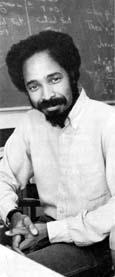Clarence Ellis, 1975

Computer scientist Clarence Ellis, shown in a 1975 MIT Lab for Computer Science brochure.
Computer scientist Clarence "Skip" Ellis was the first African-American to earn a PhD in Computer Science (1969) and to be elected a Fellow of the Association for Computing Machinery (ACM) (1997). The only black undergraduate at Beloit College in Wisconsin, he double-majored in math and physics, and earned his BS in 1964.
Ellis had brief stints at MIT, first as a graduate student (1964) and then as an assistant professor (1975-76). At the time, his research interests were in parallelism in computer systems, proofs of program correctness, and in both the theoretical and practical aspects of operating systems.
After graduating from Beloit, Ellis enrolled in MIT for graduate school, but only stayed a short time because of his civil rights activism. He eventually attended graduate school at the University of Illinois at Urbana-Champaign [UIUC], where he worked on hardware, software, and applications of the ILLIAC IV supercomputer. In 1969, Clarence Ellis earned a PhD in computer science from UIUC [under] David E. Muller.
Ellis worked at Bell Labs from 1969 to 1972 on probability theory applied to the theory of computing. In 1972 he became an assistant professor and a founding member of the computer science department at the University of Colorado Boulder to work on operating systems research.
Ellis accepted a position three years later as an assistant professor in EECS at MIT to work on research related to ARPANET. He left MIT after one year to start work at Xerox PARC and Stanford University. Ellis remained at Xerox PARC and Stanford University for nearly a decade. During his time there, he worked on the icon-based GUI, object-oriented programming languages, and groupware systems.
Ellis was a pioneer in Computer Supported Cooperative Work (CSCW) and Groupware. He and his team at Xerox PARC created OfficeTalk, one of the first groupware systems. Ellis also pioneered Operational Transformation, which is a set of techniques that enables real-time collaborative editing of documents.
From "Clarence Ellis (computer scientist)," Wikipedia